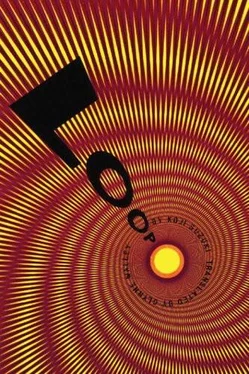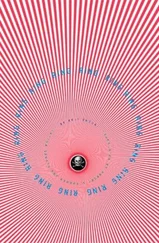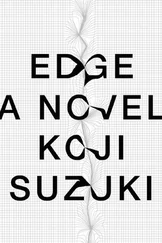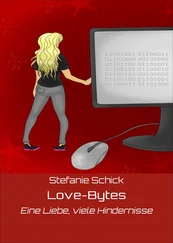"It can't be." Kaoru turned his face toward the ceiling, eyes shut tight.
"We need your help. You must cooperate with us."
Kaoru saw nothing. Eliot's words entered his ears, but he couldn't grasp their meaning. All he knew was that the world was falling apart.
Kaoru sat on a boulder hugging his knees. From the flat edge of the ridge he could see a deep valley carved over the course of billions of years. Here and there he saw whitish mottled places on the rust-colored earth. Strangely shaped rocks stood out against the horizon, looking like creations not of nature, but of man. But man had not touched the landscape that stretched before him.
He hardly remembered the scenery from his hike along the ridge-the storm and what came after felt like events in a dream. When he'd huddled alone in the dark, had he been here, in the midst of this vastness? He gazed on it now as if for the first time, following with his eyes every wrinkle and furrow in the land. They reminded him, quite naturally, of the furrows on the surface of a brain. Kaoru's own brain was engraved with many memories, but its history was still comparatively short, only twenty years. Its origins, however, were utterly out of the ordinary. It had been born not of biological reproduction, but digital recomposition.
In the distance he could see a yellowish river flowing in a near loop. A strange sight. A manifestation of the synchronicity between the real world and the virtual?
He turned around, but there was no one there. Only the building housing the elevator that connected the underground laboratories to the surface, and next to that the heliport. A helicopter, painted gun-metal black, rested motionless on the heliport. This was the jet copter that had carried Kaoru's helpless body here after the storm.
Midway between the elevator building and the heliport was a dark hole, the entrance to a huge limestone cave stretching deep into the earth. In the cavern was a vast bowl-shaped depression filled with clear water.
Eliot had been telling the truth. Pointing to the ceiling and the floor, he'd spoken of a great layer of water above them and a great space beneath them. Both turned out to be actual.
They'd dug down into the earth to a depth of three thousand feet, and there they'd found this spherical hollow space, six hundred feet in diameter, floating there like a bubble. The layer of clear water was like a shield, keeping external radiation from getting into the hollow space. The natural landscape had been put to good use in installing the Neutrino Scanning Capture System in its underground shrine.
Kaoru still hadn't seen the apparatus, that machine that would decide his fate, be it the electric chair or… what?
He'd spent nearly a week in those labs underground. Now, finally, he was getting his first look at the place from the outside. His wish to go to the surface had finally been granted. Evidently Eliot had been kind enough to admit that he wasn't about to run away or hide.
The weather was calm. Kaoru was soaking up the afternoon rays after a week without sunlight. As long as he was in the sun, he was warm enough in just a T-shirt. He shifted his arms, still folded in front of him, rubbed his upper arms, and tried to pull his thoughts together, but it was no use. He couldn't even decide what there might be for him to decide. What was he to think of his life up to this point? There were no precedents to guide him. He was deeply troubled.
It was easy enough to doubt Eliot. That might even be the simplest solution: just deny everything he said. After all, who would believe he'd been created from genetic information taken from a virtual reality program anyway? That was like denying his very existence. Maybe Eliot was simply making up a story because he wanted to experiment with the NSCS. Kaoru should deny him that: he ought to leave this mountain of his own free will, after cursing Eliot with curses the likes of which the world had never known. And then… then what? Kaoru didn't know. Certainly nothing pleasant remained for him. He was going to lose the ones he loved. All he'd have left would be regrets.
He kept going back to the starting point. Monozygotic twins share the same genes and look virtually identical. If Kaoru and Takayama shared the same genes it would certainly explain their faces looking alike. Then there was the curious sensation Kaoru had experienced the first time he'd heard Takayama's voice directly, the same queer feeling he felt when he heard his own voice on a recording. So face and voice matched. But that alone was not sufficient proof. Those could be easily manipulated by computer.
Kaoru had pointed this out to Eliot. As if he'd anticipated Kaoru's doubts, Eliot merely held out a satellite phone.
"It's your father. I think you should talk to him."
Kaoru took the receiver and heard his father's voice from where he lay in his hospital bed. And once he'd heard what his father had to say, Eliot's story began to seem credible at last.
The most convenient way to raise Takayama's clone, it was decided, would be to choose one of the participants in the Loop project and have him raise the clone as his own child.
At the time, Hideyuki and Machiko Futami had been married for four years. They had no children. In fact, a gynecologist had recently confirmed Machiko's infertility.
But still they wanted a child. Eliot and his colleagues got wind of this, and through several intermediaries they approached Hideyuki about the possibility of adoption. Both Hideyuki and Machiko were receptive to the idea of bringing a newborn infant into their home and raising it as their own child.
Events progressed swiftly, and soon Eliot, through a devious route, delivered to Hideyuki and Machiko the newborn Kaoru. They were told nothing about the child's birth or lineage, under the pretence of avoiding future trouble. There was no telling if they would have been willing to accept the child had they known he came from within the Loop.
And so they brought Kaoru up lovingly as their own child, never telling him he was adopted.
As they spoke, linked by the satellite phone, Kaoru could picture Hideyuki lying in bed, weakly grasping the receiver.
"Kaoru?"
It was a joy to hear his father's voice, though it was weaker than he remembered it.
Kaoru and Hideyuki reported to each other on their recent doings. On hearing that his son was well, Hideyuki seemed happy. "I seem to be doing better myself lately," he said, although Kaoru had no way of knowing if it was true or not. Judging from his voice, it had to be a lie. He felt that his father's time was fast approaching.
Then, calmly, off-handedly, Kaoru asked his father about his origins. Hideyuki was sincerely surprised at first that Kaoru had discovered he was adopted, but then he seemed to decide that the boy was bound to find out sooner or later, and proceeded to tell him honestly how things had been twenty years before.
As he listened to his father's explanation, Kaoru had his eyes closed and said something like a prayer in his heart. Who had approached Hideyuki-where had he gotten Kaoru from?
Kaoru's prayer was in vain. His father's explanation matched Eliot's in every detail.
"Weren't you at all hesitant, Dad, to raise a child who wasn't carrying on your genes?" Kaoru asked quietly. Even if his mother was infertile, it wouldn't have been difficult at all to create a child who inherited their genes.
"Whether or not you had our genes wasn't what mattered. Parent-child bonds come from being together, from how they act toward each other. Think about our relationship over the past twenty years. You're my son, Kaoru."
These words etched themselves into Kaoru's cells.
Kaoru said goodbye and broke the connection, feeling that he'd never speak to his father again.
Читать дальше
Конец ознакомительного отрывка
Купить книгу






![Yuriy Ktitorov - Sasha [Love]. Part 1](/books/459553/yuriy-ktitorov-sasha-love-part-1-thumb.webp)





